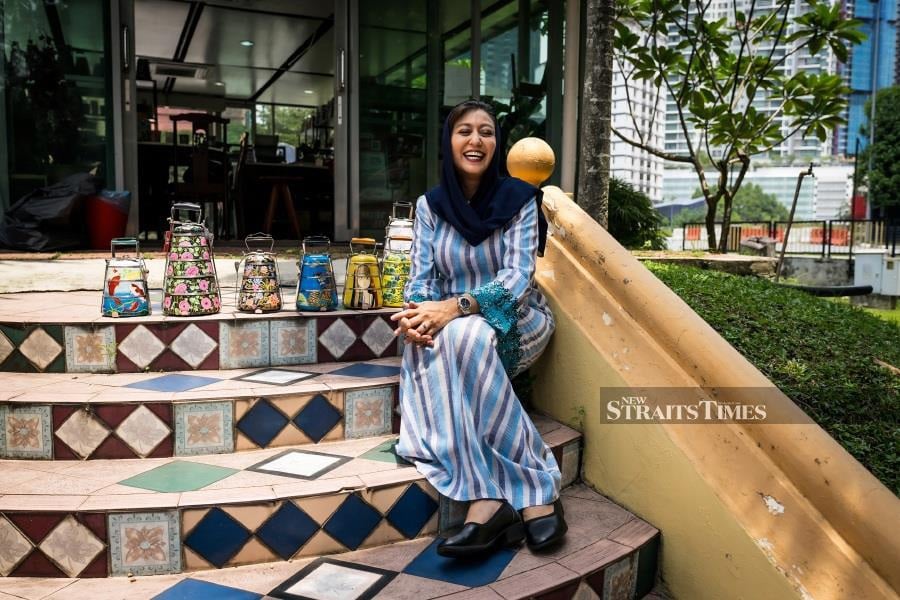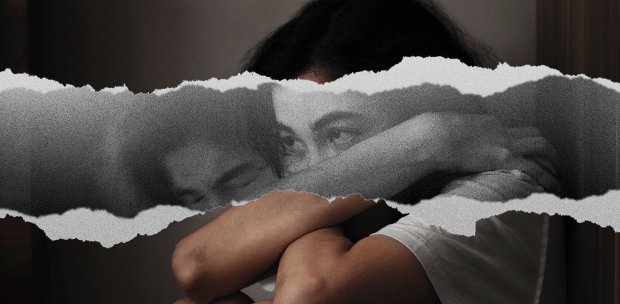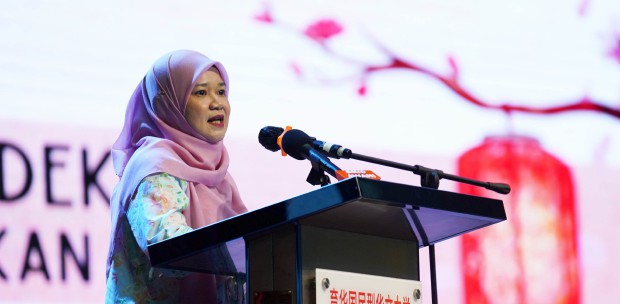THERE'S that certain joie de vivre about the lithe woman who peers out of the nondescript kiosk nestled within the compound of the Kompleks Kraf at Jalan Conlay, Kuala Lumpur.
As I give a friendly wave, her smile widens in response. Dressed in a simple baju kurung with a shawl delicately draped over her head, she greets me with a warm salam and gestures for me to come inside. Stepping into the cosy interior of the shop, I'm immediately struck by the burst of colours around me.
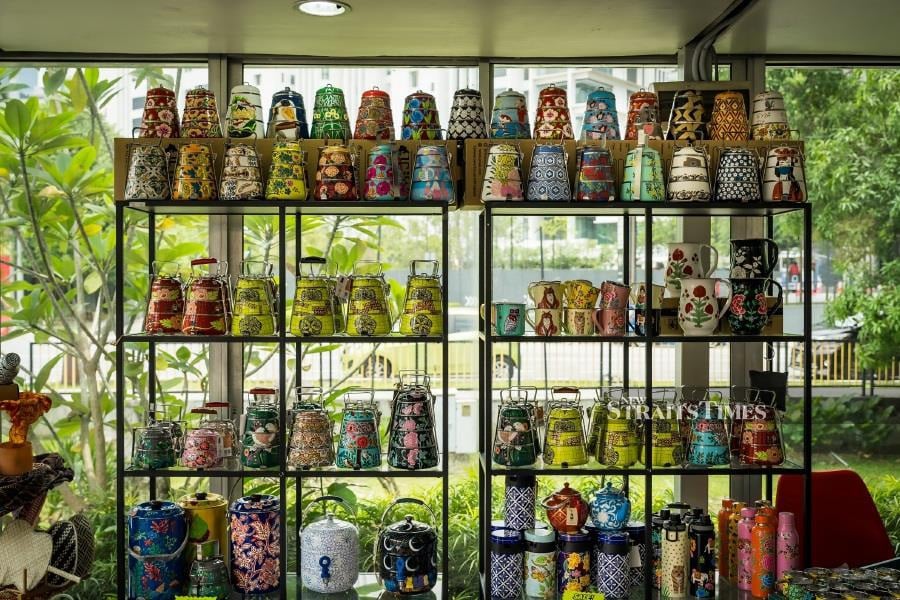
The shelves are neatly lined with hand-painted tiffins, each one boasting its own unique design. They're like little canvases, splashed with vibrant hues and intricate patterns. Alongside them are cups, mugs, butter dishes and other utensils, all sharing in the same lively spirit of artistry.
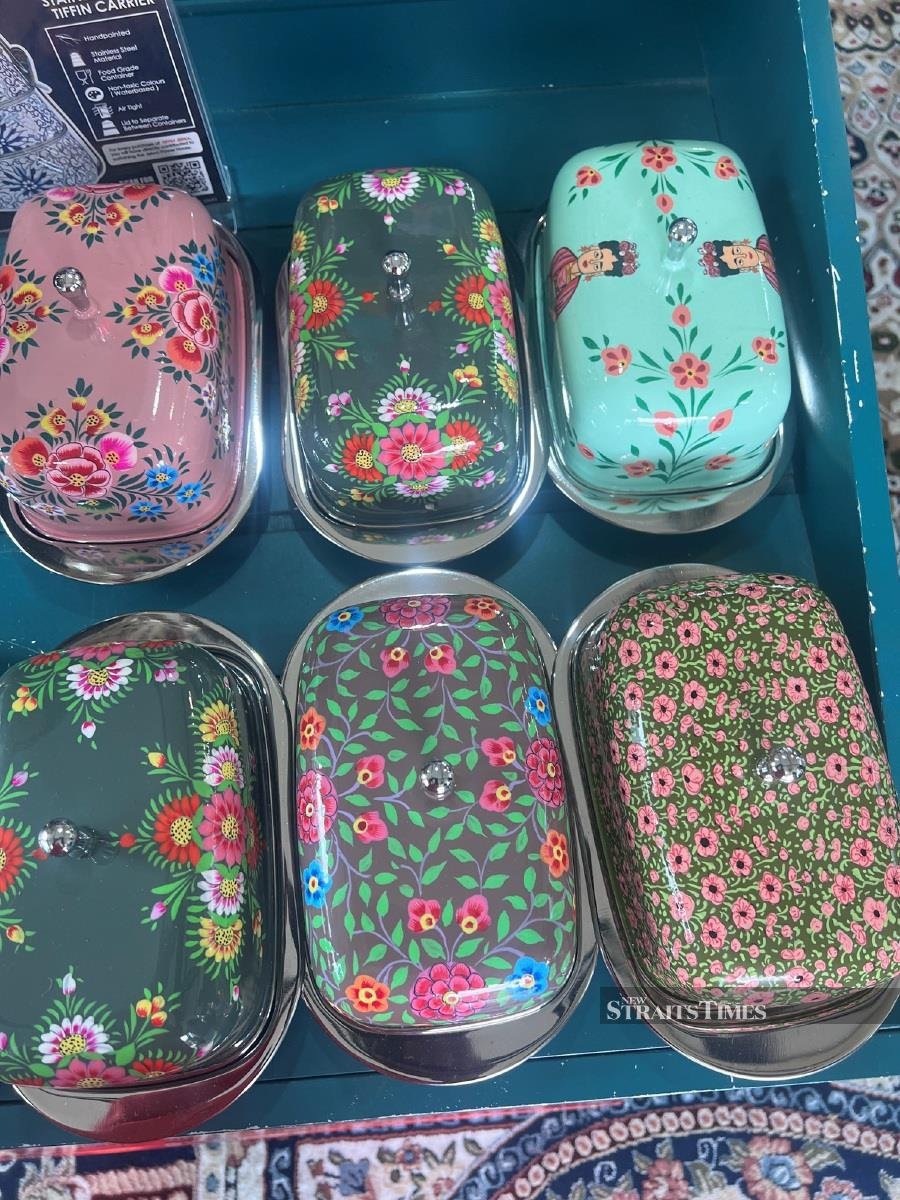
I can't help but recall the tiffin-carrier from my childhood, how my mum used it faithfully to
pack my dad's lunch every single day.
The tiffin-carrier has a rich history dating back to colonial times, originating in British-ruled India. The British, adapting to India's climate in the late 18th century, introduced "tiffin" as a lighter midday meal, derived from slang for a sip of liquor. The tiffin now encompasses a diverse range of dishes and practices, bridging colonial history with contemporary culinary traditions.
Today, "tiffin" includes a packed lunchbox, afternoon tea, savory snacks, or sweet treats enjoyed between breakfast and dinner. Essentially, anything consumed during this timeframe is considered tiffin. Moreover, the term "tiffin" commonly refers to a lunchbox. It's this lunchbox that evokes nostalgic memories for me.
Tiffins come in all shapes and sizes, but traditionally, they are mostly round. Food is stored in three to four stacking stainless-steel compartments that are firmly sealed with a tight-fitting lid and a side clip to avoid nasty spillages, plus a handle for carrying on top.
The tiffin of my childhood was plain and functional. However, thanks to Nor Fadilah Mohamed Nizar, the visionary behind Tiffin Jeiwa, the ordinary tiffin carrier has been elevated into a stylish statement piece.
Batik motifs, whimsical cats, regal owls, elaborate dragon designs and vibrant flowers in a kaleidoscope of hues decorate the exteriors of these tiffins. Retaining their practicality with robust stainless-steel handles and multiple compartments — they are enchanting and a feast to the eyes. But more importantly, they are functional.
"These tiffins are hand-painted with a special food-grade, water-based paint," she explains. "That ensures they're safe for daily use." It takes about seven days to paint an intricate design, she shares, adding that all designs are created by her and painted by her bevy of around 60 artisans who work on a project basis. "These artists include women with disabilities, domestic violence survivors and even senior citizens," she reveals quietly.
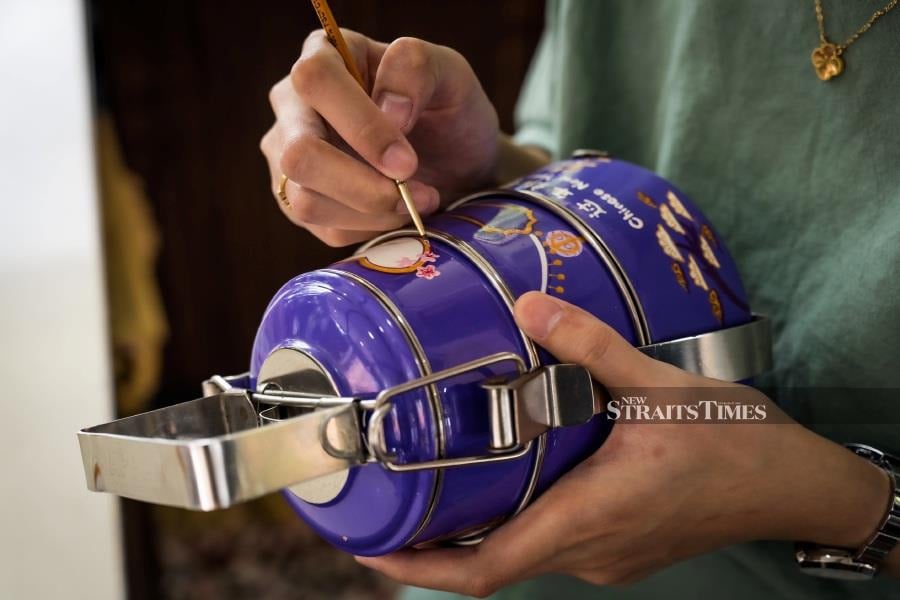
Gesturing towards the display shelves, she exclaims: "See, it's not only about the artwork itself. It's about the emotions they stir within you. These paintings make you feel alive and connected. They tell a story, taking you on a journey that resonates deeply with people."
Tiffins remind me of family and home-cooked food, I remark and Fadilah beams, nodding. "They never go out of style," she says, adding blithely: "These tiffins embody those values, of course."
In addition to Fadilah, there's artist Nur Amiratul Farahin Abdul Rahman, who assists in running the shop alongside other volunteers. Farahin, as she's known, is both hearing-impaired and non-verbal, but she's also an award-winning painter and serves as an administrator for the Jeiwa Online shop.
"There are no sales assistants here in the shop," points out Fadilah. "We don't believe in that. We have volunteers instead, who believe in our cause. We want to sell with dignity."
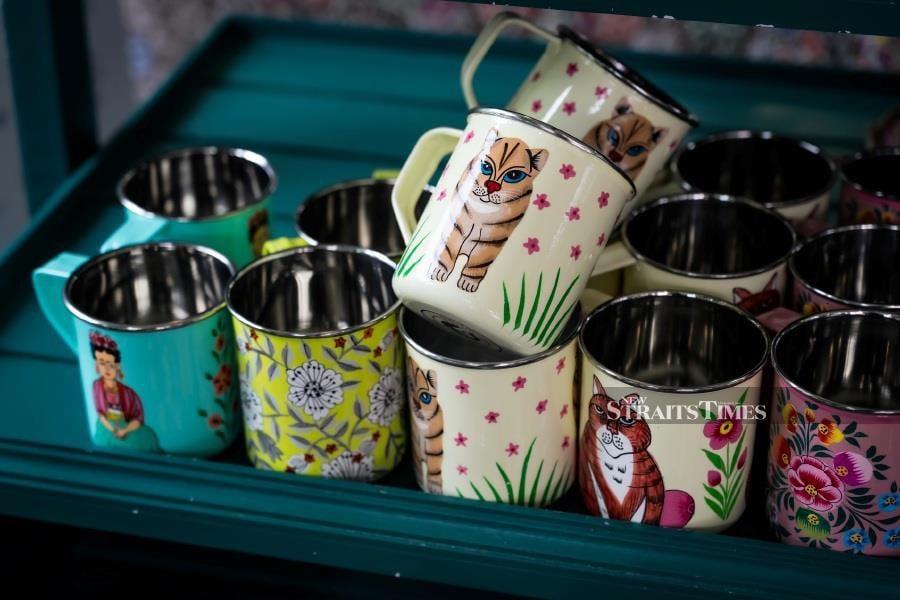
The cause behind Tiffin Jeiwa is JEIWA (Johor Empowerment of Intellectual Women Association), a non-governmental organisation (NGO) established back in 2018 by Fadilah and her group of female friends. Initially, the NGO was founded to support battered women in starting anew. However, over time, JEIWA has evolved to encompass a broader mission. It now focuses on empowering women to mentor one another, fostering networking opportunities and encouraging them to explore their full potential, among other initiatives.
"Women supporting women is the most powerful force for change in the world. What could be better than that?" she muses, smiling.
LESSONS IN KINDNESS
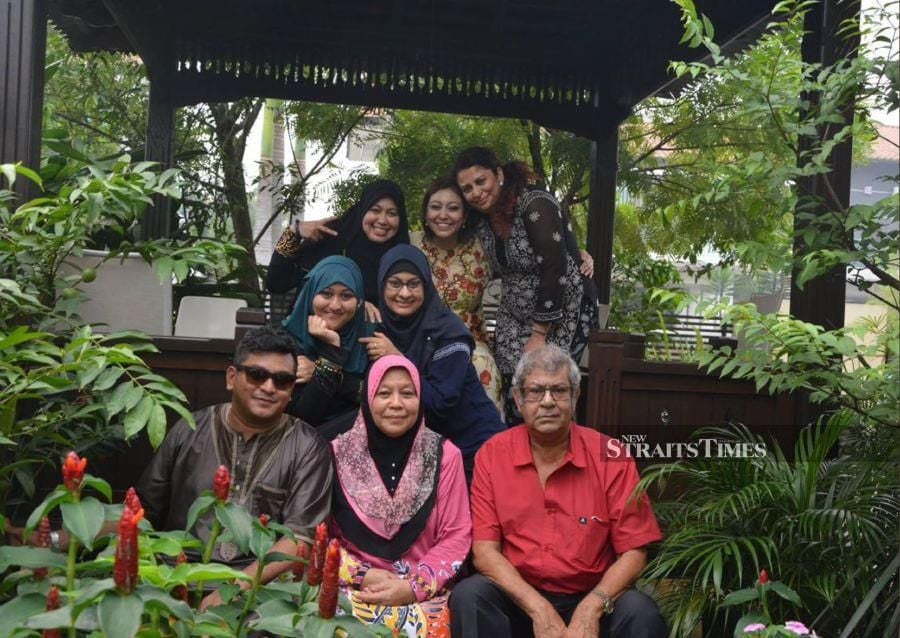
Helping people is in her DNA, she remarks, breaking into peals of laughter. "I never had any ambitions growing up," she admits ruefully, adding: "I just wanted to be a good person!"
Fadilah was born in Johor to a Chinese Bidayuh mother and a Pakistani father. Her father, a renowned film producer, was instrumental in launching television dramas for the popular Cerekarama slot on TV3.
Fadilah and her siblings constantly moved around, growing up. "We never set roots in one place," she shares. "We lived in many places and we mixed with many people. We would always have strangers milling around our home... from actors, actresses, film crew, workers… and even random people my late father would meet by chance."
In reflecting on her upbringing, Fadilah recalls a valuable lesson her father imparted to her: "My father once told me: 'Kalau kita bagi makan kat orang, kita takkan miskin' (If we feed others, we will never be poor!)"
That's why most of her own staff members would live with her initially until they could stand on their own two feet. She gestures toward the young woman busy painting a tiffin nearby.
"Even Farahin. They are all orang susah (poor), so I opened up my home, and they're welcome to stay for as long as they need to."
Her inclination to assist others began at a young age. "I naturally connected with students from challenging backgrounds," she reflects. "Befriending them and offering support came easily to me. After all, my father banyak tolong orang (helped people a lot), and that's a value he instilled in me."
A pause, and she explains quietly: "My father only studied up to Standard 6 and he began working at a very young age. From being a parking attendant to selling medicine on the streets, he hustled hard. He'd set up shop outside the National University of Singapore (NUS), determined to make a living.
"Despite his harsh upbringing, he was streetwise and resilient. He once confided in me that his aspiration was to become influential because he believed that being influential would enable him to help others."
Years later, his daughter would be accepted into NUS (where he once stood outside and dreamed big dreams). He encouraged Fadilah to pursue her studies, promising that he would pay for her education.
DARK DAYS
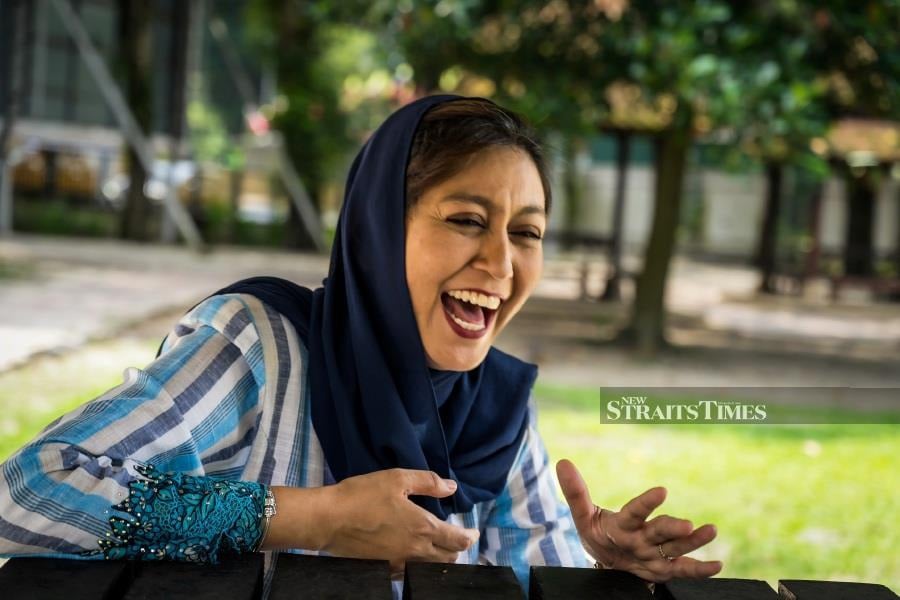
After earning her masters in Southeast Asian studies, Fadilah secured a position as an administrative and diplomatic officer in the civil service.
While her career went on an upward trajectory, Fadilah remained uninterested in chasing a hefty paycheck. "Money was never a priority for me," she admits. "Even now, I couldn't tell you how much I have in my wallet. It's not where my focus lies. As my father used to say, money isn't everything. I find contentment in simple joys. I've always been a naturally happy person, and it doesn't take much to keep me that way!"
It's easy to believe that, even if her contradictions lie between the soft, dreamy gaze of her large eyes and the startling explosiveness of her exaggeratedly wide, almost goofy smile. At once, she's both a driven businesswoman and a down-to-earth fun girl-next-door.
However, her happiness was soon clouded by the irreparable breakdown of her first marriage.
"I met my ex-husband at university. We were good friends, and he was there for me when I was hospitalised for an ovarian cyst," reveals Fadilah.
Not long after, he persuaded her to marry him. "We shared many interests, so I accepted his proposal despite my parents' concerns. They doubted our compatibility but we proceeded with the wedding anyway."
However, after tying the knot, he completely transformed into someone she barely knew. "He turned controlling and was prone to anger outbursts. Within months, I found myself solely responsible for our household, with no support from him," she recalls.
Whenever she was at home, she felt like she had to walk on eggshells, constantly wary of not upsetting him. There were occasions where she'd sleep in her car to avoid his verbal abuse. Eventually, she made the difficult decision to end her marriage. "I just couldn't continue living like that. He was a ticking bomb waiting to explode," she says simply.
It was a tumultuous divorce, but eventually, it was resolved in court. However, when the jubilant woman went to pick up her daughter from kindergarten, she was accosted by her enraged ex who began assaulting her in public, delivering repeated punches.
For the first time, her wide smile slips a little.
"It was surreal," she says quietly. "He punched me at least 10 times, in full view of everyone. Bertubi-tubi! (continuously). People watched but no one intervened." As Fadilah fell to the ground, he kept on kicking her hard. His mother was present but she did nothing to stop it.
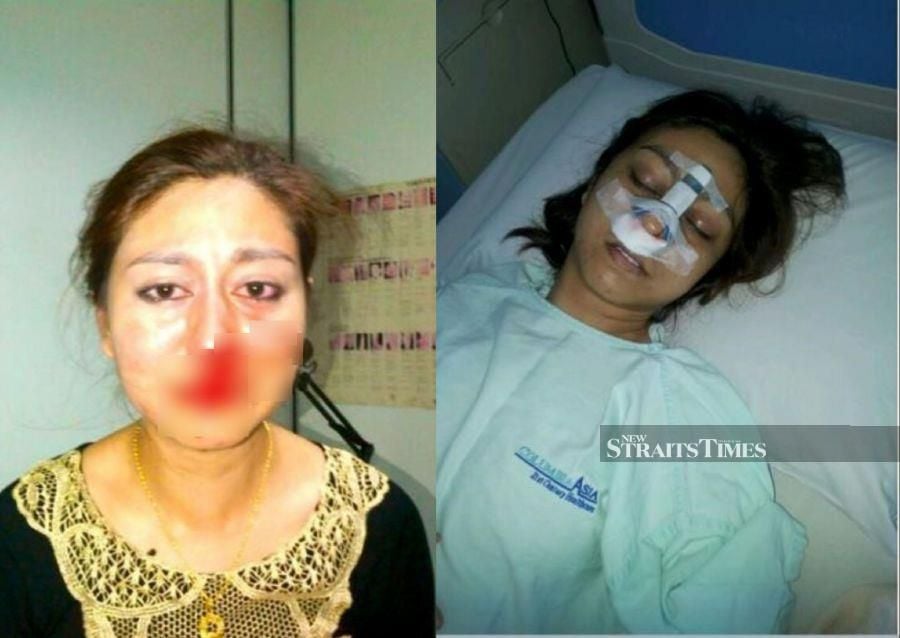
Realising that no one was going to help her, she finally picked herself up and with blood dripping down her face, Fadilah drove herself to hospital and later, to the police station.
"It's a good thing I was an educated woman. I knew the procedures," she says drily. "… and I typed my own police report!" She soon learnt she had a broken nose and needed an operation. "Imagine, I was starting a new job back in Johor in a few days and here I was, with a fractured nose!"
Fadilah experienced firsthand the challenges of seeking justice against her ex-husband. She found that the legal system offered little protection for women in her situation. Enduring domestic violence is already traumatic, but it becomes even more degrading when your entire life is dissected in open court by lawyers.
Accompanied by the Women's Aid Organisation, Fadilah sought assistance to address her situation. "We need to reform how domestic violence survivors are treated within the legal system in Malaysia," she emphasises. "Domestic violence is a delicate issue, and having all your personal details exposed in court is incredibly undignified. It's like enduring a second assault in front of everyone. I can't imagine how those unfamiliar with legal procedures navigate through this. It's no wonder some give up, allowing the assailant to go free."
Refusing to relent, she persisted with the case until she emerged victorious. "I refused to cry. I spoke up, kept my composure and dressed well," she recounts with a smile. Ironically, on International Women's Day in 2015, Fadilah finally found justice and her ex-husband was sentenced to jail.
RISING FROM THE ASHES
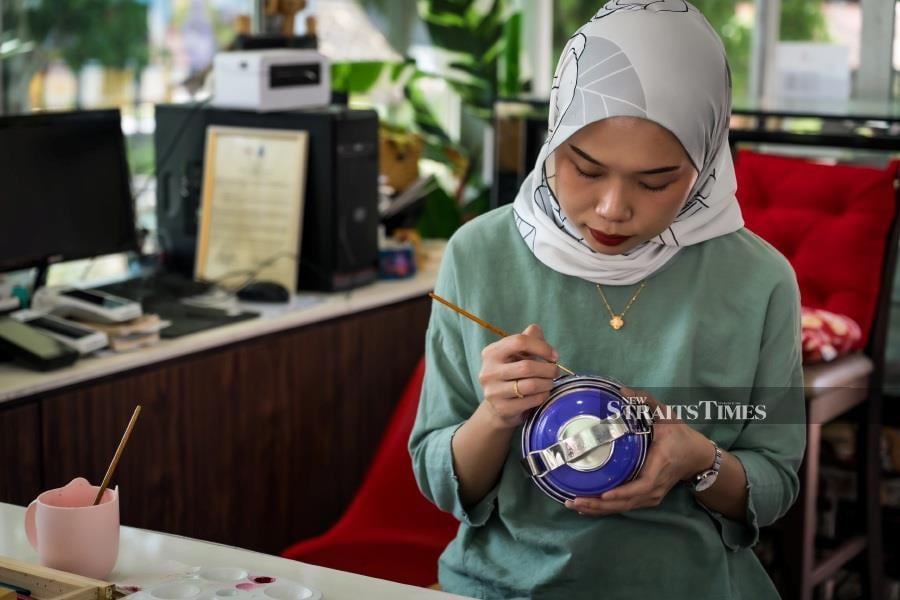
Recognising the dire need for support and opportunities for women enduring domestic violence to rebuild their lives, Fadilah established JEIWA. "As a working woman, you're pulled in so many directions," she explains. "You have to excel in your job to earn a living, manage your court case, and take care of your family. It's overwhelming. That's where JEIWA steps in."
The NGO ran programmes that could improve the plight of women trying to get out of the cycle of abuse. "We provided legal advice, we counselled them, gave them make-overs and mentored them," the 42-year-old shares. More importantly, they had the opportunity to improve their lives.
"They needed to get out of their toxic zone and stop feeling sorry for themselves," she says bluntly, adding: "Be positive and focus on your potential. That was what JEIWA was all about."
The impact they made led to the NGO being invited to present papers internationally on strategic intervention approaches to support women. "We didn't want women to simply rely on baking cakes or cookies for a living," Fadilah asserts. "We aimed to empower women with the skills to earn a substantial income!"
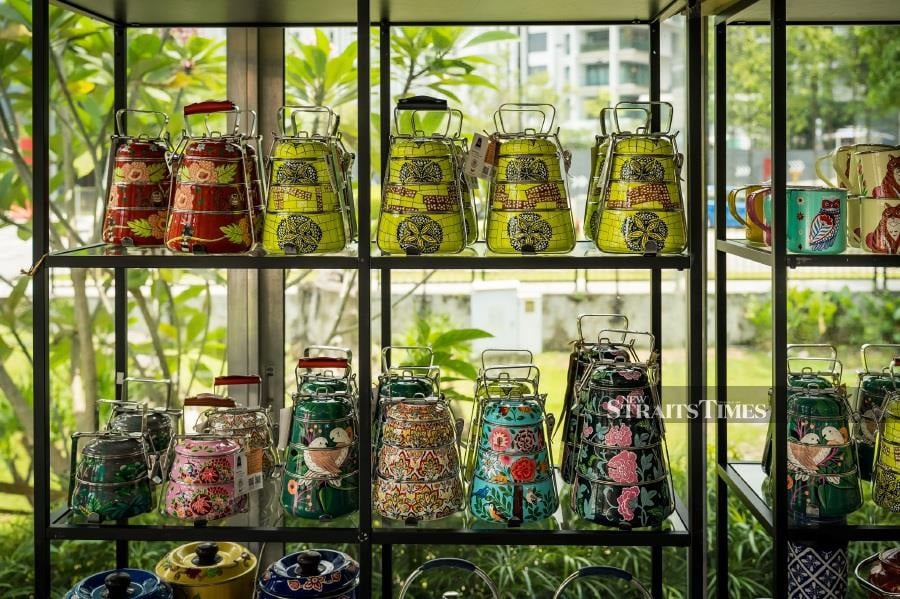
JEIWA Powerhouse, the pioneering Malaysian women-integrated community centre, found its home in Paradigm Mall in Johor Baru. "We organised numerous enrichment programmes there for women," she recounts with pride.
Subsequently, the community centre evolved into a spa managed by women from the centre. Presently, there are plans in motion to establish a dedicated centre for women in Batang Kali — the Jeiwa Full-Fledge Community Empowerment Hub, envisioned by women, for women.
"We're not in the business of running a charity to aid disadvantaged women," she states firmly. "Plenty of organisations are already excelling in that. Our goal is to raise up confident women entrepreneurs and get them to become economic powerhouses."
There's a place for everyone in JEIWA, she says quietly. "Many lives have transformed because we helped them unreservedly. It's what the NGO is all about. The same DNA runs there too!"
The exquisite display on the open shelves resonates with countless stories of redemption, empowerment, and triumph over adversity. Here, in this little shop, the ever-smiling Fadilah, surrounded by her circle of women friends and inspired by her father's legacy of compassion, continues to transform lives — one tiffin at a time.


